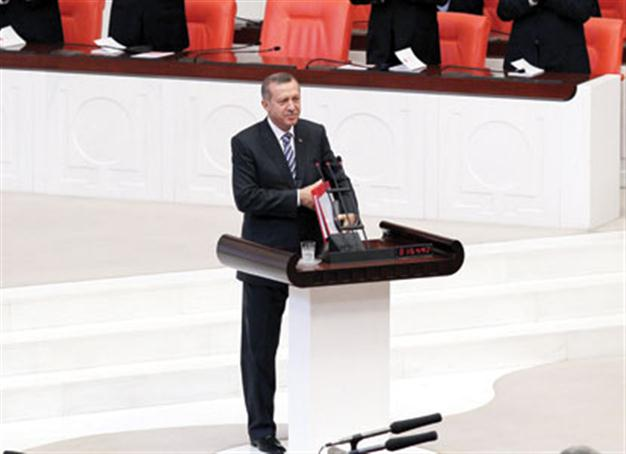Historic convention for Erdoğan, AKP
Göksel Bozkurt Hürriyet Daily News

AKP’s major central congress, which will convene in September 2012 will carry historic importance for Turkey’s future. AA photo
Will Prime Minister Recep Tayyip Erdoğan become a candidate for presidency? If the government does not make any new legal arrangements regarding the presidential term and if it adopts the seven-year term, we will receive an answer to this question at the earliest in September 2012, because the Justice and Development Party (AKP) will convene for its 4th Ordinary Congress on that date. The calendar leading to that process has become clear as of the beginning of this month. The AKP will hold township congresses on Nov. 18 and district congresses on Dec. 31. Provincial congresses will finish by June 30. The major central congress will convene in September 2012.
According to Article 75 of the AKP statute, a member can be elected as party leader as many times as “the founding congress plus four ordinary congresses.” In these circumstances, Erdoğan is entering his last congress. This critical timetable actually forms the basis to determine any alterations in the AKP vision through 2022.
If Gül’s presidential term is accepted as seven years, his term will end in August 2014. If it is accepted as five years and if he is elected a second time, then that would mean Erdoğan has postponed take over at Çankaya until 2017, but this seems like a far-fetched scenario now. If Erdoğan becomes a candidate, he will be elected as the head of his party for the fourth and last time. Erdoğan’s term as party leader will expire in September 2014; that is one month after – if Gül serves seven years – Gül’s term expires.
This interesting timing makes the AKP convention in September an extraordinary one. The corridors are busy; everybody is creating a different scenario. It is impossible to predict anything today. Neither Erdoğan’s nor Gül’s plans are known. The only truth known is that if Erdoğan wants to ascend to Çankaya, the September congress will all of a sudden transform into a historical basis. In that case, the future of AKP and its future staff will be re-determined at that congress; interparty balances will be reviewed and the cards will be dealt again. Erdoğan will design the post-Erdoğan AKP in that congress.
As whispered in the corridors, if a “Putin-Medvedev model” is to be actualized; that is, if Erdoğan takes Çankaya and Gül takes the head of the AKP, then timing will also be important. Gül will leave the presidency in August 2014. It will be the people who will elect the president. Erdoğan will leave the party leadership to become a candidate for Çankaya. Gül also will be able to head the AKP at the September congress after Çankaya.
If after Erdoğan ascends to Çankaya, a “new era without Gül” is to start in the AKP, this time the September congress will give the opportunity to Erdoğan to determine the name that will lead the AKP after himself and to mold the party accordingly.
No matter what they say, the AKP’s September 2012 congress is at least as significant as its founding congress in 2001. In this historic congress of AKP, not only the party’s but also the fate of Turkey targeting 2020 will be voted on.
AKP IN SEARCH OF RAPID PASSING OF AMENDMENTS
It is being whispered in the corridors that the ruling AKP is in search of a means of rapid passing of motions in Parliament and that it has started works in this regard. The point of origin is the opposition’s frequent attempts to obstruct motions in the general assembly. Group proposals submitted consecutively can obstruct the proceedings in the general assembly at least four hours in one day.
Motions of censure and interpolations, because they are categorized as “urgent,” come before other items. The government wing is bothered by this. Let me also share another whisper: If a possible alteration proposal to internal regulations is to be debated, then a clause regarding “the permit for female deputies to wear trousers and headscarves” could be added to the proposal at the last minute. It looks as if the probability of a clash between the government and the opposition in the general assembly over internal regulations is strengthening.
CHP LAUNCHES EMERGENCY PACK ON DEMOCRACY
The main opposition Republican People’s Party (CHP) wanted a parallel arrangement in the sub-legal norms known as the “democracy package” in the parliamentary Constitution Conciliation Commission. CHP’s aim was to clear the mines that restrict freedom of expression and media in the laws as a new liberal constitution was being written. The AKP opposed the package on the grounds that “This is not our job,” and the proposal was left up in the air. Upon this, the CHP group launched an initiative under the name “emergency democracy package.” Tasks have been given to deputies with law background for amendments to the Turkish Penal Code (TCK), the anti-terror law, the press law, the political parties law and the law of assembly and demonstration. The amendment proposals will include re-arrangement of periods of arrests in the Criminal Procedure Code (CMK) and the lifting of special courts. The proposals to be drafted in accordance with international norms will be presented to Parliament in the shortest time possible. The aim is to corner the AKP with amendment proposals boosting freedoms to European Union standards.
Let’s see how the CHP’s “emergency democracy package” will reflect in the governing group.











